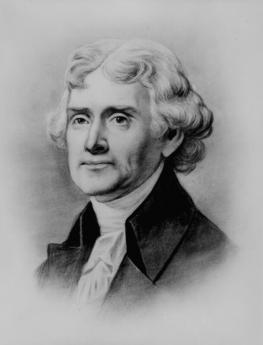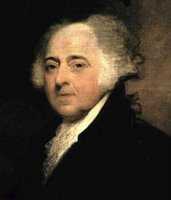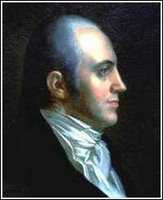Related Topics
Philadelphia Legal Scene
The American legal profession grew up in this town, creating institutions and traditions that set the style for everyone else. Boston, New York and Washington have lots of influential lawyers, but Philadelphia shapes the legal profession.
Favorites - II
More favorites. Under construction.
The Supreme Court Arrives, A Little Late

|
| Jefferson |
Thomas Jefferson became President in the country's fourth Presidential election; John Marshall was the fourth Chief Justice of the United States. These two Virginians hated each other personally, and each hated what the other stood for. Jefferson had been aboard when the Constitution was written, and when he came home it was too late to change it. But it didn't suit him at all, whereas Marshall devoted his whole life to strengthening it. The Constitutional System had evolved pretty far in sixteen years, except for the Supreme Court. From the Moment Marshall administered the oath of office to Jefferson, the war over the Court was on. Marshall was precise, concise, and implacably logical. Jefferson issued great clouds of uplifting rhetoric that were often hard to follow. People of those two personality types almost always detest each other.

|
| John Adams |
By this time, it was becoming clear that minority rights were most effectively protected by confronting the party in power with the near certainty of being soon out of power, hence soon exposed to retaliation. The problem this solution generated was then how to maintain national stability when power was constantly shifting. Marshall's solution was to have a semi-permanent judicial system, with the power to overrule both President and Congress on fundamental, Constitutional, issues. It is not clear whether this concept had always been in his mind, or whether the experience of seeing his Federalist party swept out of office made him cast about to find ways to preserve their will. It now scarcely matters, since outgoing President John Adams had made a whole pack of "midnight" appointments as he left office, and Jefferson promptly tried to throw them out. That, in essence, is what the famous case of Marbury v. Madison, was all about. When the smoke cleared, Marshall had established that the Supreme Court could overrule the other branches of government if it could find support in the Constitution. And the Constitution largely means whatever the Supreme Court says it means. That was a bitter pill for Jefferson, who had proclaimed and campaigned on the principle that the will of Congress was supreme.

|
| Burr |
The other sweeping concept which Marshall introduced into our system of government was to transform the Supreme Court from a mere tribunal into a pulpit for announcing fundamental principles of law. His method was to decide cases on the basis of wide ranging constitutional principles when the same decision could have been made on narrow technical points. In the famous trial of Aaron Burr,, Marshall could quite properly have refused to hang a former Vice President just because Jefferson hated the man, especially since the main witness against Burr was a notorious liar and scoundrel. Instead, these features gave Marshall the cover to expose weaknesses in the constitutional definition of treason, which contained muddled thinking but vexingly specific language. One man's legal clarification is another man's legislating from the bench, of course, but the innovation was nevertheless Marshall's. By holding the lower courts strictly to the letter, this approach concentrated interpretative latitude in one place, where it cannot escape public notice. The European Union, struggling to match the American model, will be hard put to match this particular unwritten subtlety.
REFERENCES
| American Sphinx:The Character of Thomas Jefferson Joseph J. Ellis ISBN-13: 978-0679764410 | Amazon |
Originally published: Friday, June 23, 2006; most-recently modified: Monday, June 03, 2019